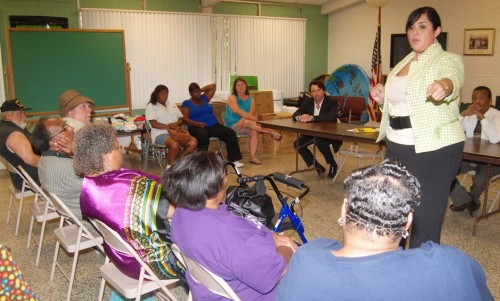Ariel Lynn Guidry
November 11, 2008
Southern Smith
November 13, 2008Discussions between state FEMA representatives and residents of the Senator Circle public housing complex in east Houma continued last week.
At the request of the Southern Christian Leadership Conference, FEMA officials came to discuss new and existing programs that residents may be eligible for and any problems they have had with getting hurricane recovery assistance.
“We’re learning that there is a lot we can do, but not a whole lot of people know how we can help them,” said Gail Tate, head of FEMA’s Office of Intergovern-mental Affairs. “There are some commonalities across the state with various challenges they (those affected by Gustav and Ike) are having. Hearing those stories helps us determine how to resolve those issues.”
One of the existing programs that victims of Gustav and Ike may qualify for is the Disaster Case Management pilot program.
A partnership between FEMA, the Department of Housing and Urban Development and the Louisiana Recovery Authority (LRA), Disaster Case Management that involves referral assistance for applicants with such continuing needs as housing, restoration of benefits, access to voluntary agency resources, furniture, utilities and services, transportation, employment, application assistance, and health and well being.
Potential recipients do not apply for case management. FEMA representatives identify them through information provided from government and volunteer relief agencies.
FEMA began to provide funding for the program earlier this year to resolve open cases from hurricanes Katrina and Rita.
Because many of the Senator Circle residents suffered damages in the 2005 storms, its residents may be eligible for case management.
FEMA recently awarded up to $32 million to the LRA to continue the program through March of 2009.
“This case management program is on a much bigger level than other assistance programs we’ve had through volunteer agencies,” said Judith Garza, FEMA’s Deputy Individual Assistance Section Chief of the Louisiana Transitional Recovery Office. “Headquarters supports it, and it’s a statewide initiative that’s in place. It’s not just individuals working together for this one group. We’re bringing on multiple agencies and multiple partners. We have a lot of funding.”
“It’s new for us because FEMA is not a social services program,” said Tate. “We understand fully that recovery is not just about your lost personal property or the structure you lost. It’s about all those intangible elements of your life back together again.”
After the meeting, six caseworkers met with Senator Circle residents to address their plight. In particular, they wanted to know about Small Business Administra-tion loan applications and FEMA letters stating they would not receive any money or only a few hundred dollars for damages to their apartments.
Garza explained that filling out the SBA application is a vital part of continuing the assistance process.
She also said denials often stem from a miscommunication at the time applicants register with FEMA or at the time of inspection.
“If the damages are significant for an individual not to be able to stay in their home, inspectors will ask, ‘Are you willing to relocate?’ Garza said. “That’s a scary question. That person may answer, ‘No, I’m not willing to relocate.’ What they don’t understand is it means temporarily while your home is being repaired. Sometimes they think, ‘I can’t afford to relocate while my home is being repaired.’ They don’t realize FEMA gives rental assistance because of that question.”
Another reason people are considered ineligible is multiple household members file on the same property as head of household, according to Garza. That creates duplicate registrations, which automatically halts the application process.
Also applicants say they have insurance, but don’t state what type insurance they have.
“If the damage was flood, but they have homeowner’s (insurance), all we need is that piece of paper saying those damages aren’t covered, and we can provide some assistance,” Garza said.
Most of the assistance comes from the Individual and Household Program (IHP), which provides a maximum award of $28,800 for home repair, rental assistance and personal property.
Attendees such as Erroll Haney, a Bayou Tower resident who has been living out of truck since Gustav, seemed satisfied with their one-on-one encounters with the caseworkers.
Haney did not want temporary shelter until Bayou Tower reopened. He just wanted to replace the hearing aid he lost while evacuating.
“I’ve been using this amplifier until I get me one,” he said.
As for living out of his truck, “Sometimes I go by some relatives house, take a bath, and go back to my truck,” he said. “I’d rather be by myself. I’m just a proud man like that.”
FEMA has begun referring more than 6,500 eligible families displaced by hurricanes Gustav and Ike to HUD’s new temporary disaster housing program, Disaster Housing Assistance Program-Ike (DHAP-Ike). The program runs until March 2010.
For the SCLC, which has been demanding FEMA to do more to help the Senator Circle residents, the meeting was considered a success.
“Our people were not educated to what they needed to do to receive help,” said the Rev. Dr. Vincent Fusilier, SCLC Terrebonne Parish chapter president. “They needed to know how to file, how to appeal and how to follow the process. That’s all we were asking.”
Fusilier added, “If they follow the process, I believe they will be satisfied in the end. Please don’t give up because I’m not going to give up. I’m going to stay with this until the end.”
“We shed some light on our programs and services and that what happened after Katrina and Rita is very different from what happening with Ike and Gustav,” Tate said. “That’s important because people had that initial contact with FEMA after Katrina and Rita and they had certain expectations. Anytime you have a better understanding, it helps everybody.”
Judith Garza, FEMA’s Deputy Individual Assistance Section Chief of the Louisiana Transitional Recovery Office, explains the programs and services available to Senator Circle residents. * Photo by KEYON K. JEFF










